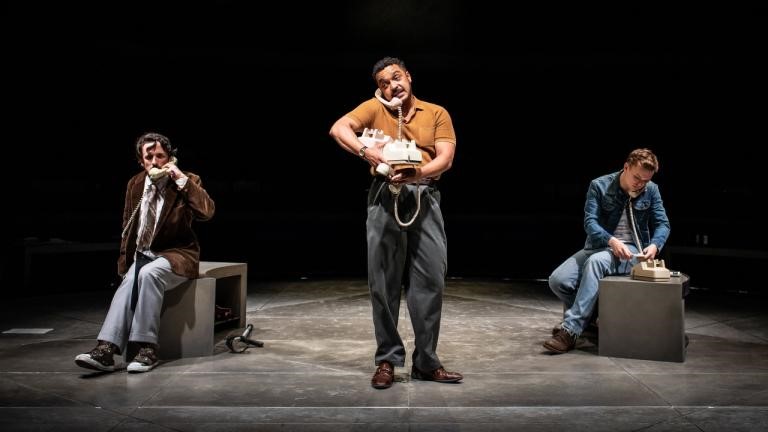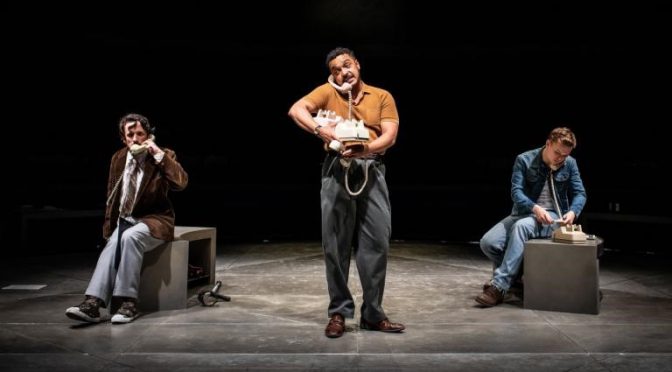By Goh Wei Hao
Written during a different time, when the world was consumed by another virus, the themes of The Normal Heart remain extraordinarily relevant in today’s world.
The play is set in New York City, and takes place over a span four years in the 1980s — during the early days of the HIV epidemic when the virus did not yet have a name. It is centred around the writer Ned Weeks and the gay health advocacy group that he helped to establish along with closeted banker Bruce Niles, the free love advocate Mickey Marcus, and the self-described “Southern bitch,” Tommy Boatwright. Also part of this ragtag group is Dr Emma Brookner who pushes the group to campaign harder for their voices and her advice to be heard by the community.
After watching the 2021-revival of Larry Kramer’s largely autobiographical play, a question lingers in my mind: What does it mean to be a moral gay man?
Kramer refuses to provide an easy answer as he does not depict any of the characters as being morally superior. There are openly gay characters, such as Ned, who argue for direct and public confrontation with the authorities who refused to get involved in this ‘gay’ disease, and others like Bruce who prefer to work from the ‘inside.’ Some of the members of the Gay Men’s Health Crisis (GMHC) argue that having sex with other man is a civil right fought long and hard for and should not be curtailed, while others argue that the community needs to take a stand to be celibate to save lives.
In the first act, their ideological differences are played out whenever all the characters gather together on stage: a heated argument will ensue which results in everyone walking away more sure of their beliefs than ever. The characters, however, stopped being as dogmatic and sure of themselves in the second act. Instead, they started to become more honest with each other, and it became increasingly clear that they may not be so different from each other as deep down, they all share one thing in common: fear.
This is revealed in their most vulnerable moments, resulting from the deaths of their friends and the emotional labour of running the increasingly encumbered GMHC, which manifest in the play as monologues — where the characters try to convince the others, but most importantly, themselves, that what they have not been wrong all along. The monologue that had the greatest impact on me was the one by Mickey as I disagreed with his moral position the most: Mickey insisted that because despite the growing evidence that gay men are being killed off by the still-unnamed virus, the GMHC did not have the right to tell the community to stop having sex.
It seemed juvenile to me, and also an act of indirect violence, to refuse to give up sex for the safety of others. At least that was what I thought until Mickey revealed what he was truly frightened about: to be thought of as a murderer, that everything he fought for, such as the sexual liberation of gay men, abetted in the murder of his friends. I wanted to scream at the stage to Mickey that he is not a murderer. It disappointed me to see the generation I regard as heroes disavowing everything they have done and achieved. But what struck me the most is the irony that I vilified him in the beginning simply because he thought differently — that perhaps I am the juvenile one to think that there is a singular and moral way to live as a gay man.

From left to right: Daniel Monks as Mickey Marcus, Danny Lee Wynter as Tommy Boatwright, and Henry Nott as Grady. Image credit: Helen Maybanks (www.nationaltheatre.org.uk)
Towards the end of the play, the seemingly self-assured characters seem to all come to the realisation that they are equally juvenile. For instance, it becomes increasingly clear that Ned’s actions are the results of his ego and privilege as a white man from a presumably upper-income family, and that Bruce wants to have his cake and eat it too — to continue to have sex and romantic relationships with other men but still be able to live as a heteronormative cis male.
But it was clear to me by the end of The Normal Heart that the juvenility of the characters, and of my own, stem from our fears. For the characters, it is the fear of seeing their friends die. But the play never neglects to remind you that people are dying from the disease as characters that have died from the virus continue to linger in the background with their purple lesions multiplying every time they reappear.
But can we really blame the characters for their ‘juvenility,’ or for anything they have done? As gay men, we grow up in a culture where we are held to a higher moral standard. Every single one of our action is held under a microscope and scrutinised. One slip up and we could undo years of progress for our community. And this is not including our personal fears. I am frightened my lover will leave me. I am frightened to disappoint my parents. I am frightened that I will amount to nothing. I am frightened that I am writing this simply to try to absolve myself of the immoral things I have done.
And most of all, I am frightened because I do not know what to do about any of this. Because like all the characters, I walked away from the play realising that I do not know a single thing. To try to answer the question of what makes a moral gay man, I could have waxed lyrical about what so-and-so philosopher said. That is what researchers like myself do, right? To find the normative answers to questions. But that would be disingenuous.
Instead, the answer to the question posed at the beginning of this piece, of how to be a moral gay man, might be in accepting that we will never know what is the right thing to do — that not knowing can be productive too. At the end of the play, Ned comments at how heartened he felt when he went back to Yale, his alma mater, and saw a room full of queer students dancing. The glean in his eyes reveals his admiration of the youth, and the hopes he places in them: that maybe they can finally find the solution to the issues we cannot.
Perhaps that is all we can do: to try our best to create a better future for the next generation, so that they might have the chance to create a better world than the one we have now.
The Normal Heart is playing at the National Theatre until the 6th of November. More details can be found at: https://www.nationaltheatre.org.uk/shows/the-normal-heart.
Goh Wei Hao is a PhD student at King’s College London and National University of Singapore, under the Joint PhD Programme. He works primarily in the field of contemporary art, with a geographical focus on China and Singapore. His research interests can be broadly described as the study of power and dissent in authoritarian societies, focusing on topics like cultural hegemony, performance theories, postcolonialism and gender. His current research looks at the representations of marginality in post-Mao Chinese performances.
Blog posts on King’s English represent the views of the individual authors and neither those of the English Department, nor of King’s College London.
You may also like to read:

